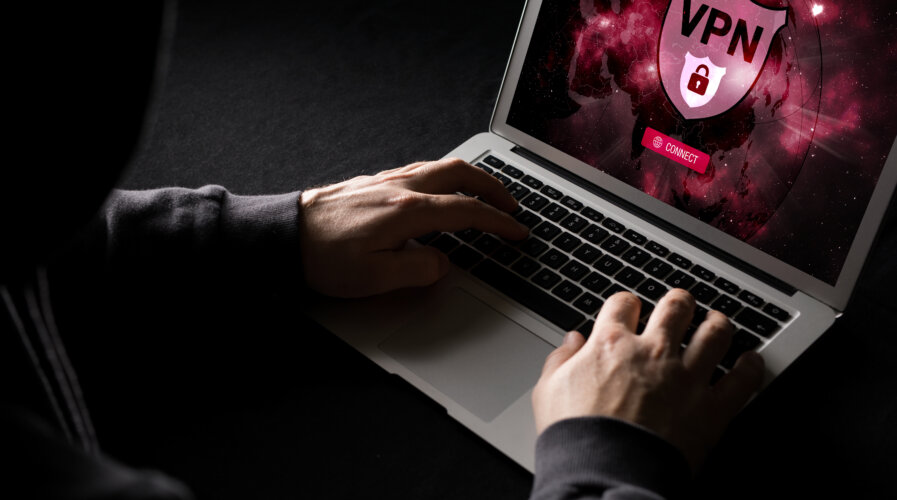
(Source – Shutterstock)
Can a VPN actually help protect you from hackers?
The digital world’s risks, such as data breaches and cyberattacks, are alarmingly high. As dependence on the internet increases for daily activities, from professional tasks to entertainment, it becomes crucial to consider how online activities can be shielded from potential hackers. A tool that has gained significant attention in recent years for this purpose is the Virtual Private Network, or VPN. But does a VPN provide real protection against hackers? This article delves into the issue.
VPN: A closer look
A VPN is a service that encrypts an internet connection, enhancing the security and privacy of online activities. When someone connects to a VPN server, their original IP address is hidden, and their data is encrypted, rendering it unreadable to anyone who might intercept it. This includes hackers, Internet Service Providers (ISPs), governments, and other third parties.
The role of VPN in cybersecurity
VPNs cannot provide foolproof protection against all types of cyber threats, but they play a significant role in an overall cybersecurity strategy. Here’s how:
- Device protection: Gadgets like laptops, tablets, and smartphones can become enticing targets for cybercriminals, especially when used on public Wi-Fi networks. By using a VPN, individuals can protect their device’s data from potential Man-in-the-Middle (MiTM) attacks by hackers.
- Secure public Wi-Fi connections: Public Wi-Fi networks often lack robust security, making them fertile ground for cybercriminals. Using a VPN, data is routed securely, reducing the risk of exposing sensitive information.
- IP concealment: A VPN replaces an individual’s real IP address with one from the VPN server to which they’re connected. This protects privacy and makes it more challenging for hackers to target individuals, as hackers can’t see the real IP address or pinpoint the geographic location.
Do hackers have the upper-hand? Limitations of a VPN
Despite their usefulness, VPNs have limitations. A Forbes survey revealed that most respondents use VPN services for security purposes. However, 57% of these VPN users reported experiencing a cyberattack.
While this may seem paradoxical, a VPN can only guard against specific types of attacks. They aren’t a panacea for all cyber threats. Here are a few limitations:
- Phishing attacks: VPNs can’t protect users from phishing attacks where hackers deceive individuals into divulging sensitive information. This kind of protection requires user awareness and education.
- Malware: A VPN can’t shield the device if malware is unwittingly downloaded. Therefore, it’s essential to complement VPN usage with a reliable antivirus program.
- VPN provider security: VPN providers’ security standards and practices vary widely. Some might employ weak security protocols or even record user data. Hence, choosing a reputable provider that follows a strict no-logs policy and uses robust encryption standards is critical.
Selecting the right VPN to protect against hackers
Factors like the provider’s reputation, security protocols, privacy policy, and logging practices should be considered when choosing a VPN. VPNs using advanced encryption standards like AES-256 and protocols like OpenVPN or WireGuard are desirable.
The VPN’s server locations should also be taken into account. A greater number of servers across various locations usually means better speed and reliability. Lastly, it’s beneficial if the VPN provider includes a kill switch feature that automatically disconnects the device from the internet if the VPN connection fails, thereby preventing data leakage.
In conclusion, a VPN can significantly bolster online security and privacy by making it difficult for hackers to intercept or decipher data. However, it’s crucial to remember that no single tool can provide 100% protection in cybersecurity. Utilizing tools like VPNs can make it considerably more challenging for hackers to target individuals. The key is to build a comprehensive defense system, piece by piece, contributing to a more secure online presence.
READ MORE
- The criticality of endpoint management in cybersecurity and operations
- Ethical AI: The renewed importance of safeguarding data and customer privacy in Generative AI applications
- How Japan balances AI-driven opportunities with cybersecurity needs
- Deploying SASE: Benchmarking your approach
- Insurance everywhere all at once: the digital transformation of the APAC insurance industry


